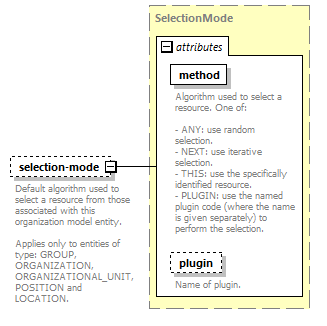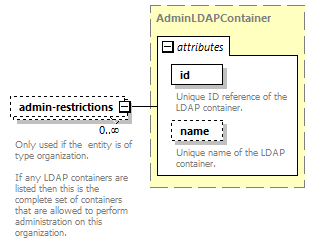| diagram |  |
||||||||||||||||||||||||||||||||||||||||||||||||||||||||||||||||||||||||||||||||||||||
| namespace | http://api.de.n2.tibco.com | ||||||||||||||||||||||||||||||||||||||||||||||||||||||||||||||||||||||||||||||||||||||
| type | extension of XmlModelEntity | ||||||||||||||||||||||||||||||||||||||||||||||||||||||||||||||||||||||||||||||||||||||
| properties |
|
||||||||||||||||||||||||||||||||||||||||||||||||||||||||||||||||||||||||||||||||||||||
| children | dynamic-id-attr qualifierSet selection-mode child admin-restrictions | ||||||||||||||||||||||||||||||||||||||||||||||||||||||||||||||||||||||||||||||||||||||
| attributes |
|
||||||||||||||||||||||||||||||||||||||||||||||||||||||||||||||||||||||||||||||||||||||
| annotation |
|
||||||||||||||||||||||||||||||||||||||||||||||||||||||||||||||||||||||||||||||||||||||
| source | <xs:complexType name="XmlOrgModelNode"> <xs:annotation> <xs:documentation>Details of the properties and children of an organization model entity. This information is used when browsing the organization model.</xs:documentation> </xs:annotation> <xs:complexContent> <xs:extension base="XmlModelEntity"> <xs:sequence> <xs:element name="selection-mode" type="SelectionMode" minOccurs="0"> <xs:annotation> <xs:documentation>Default algorithm used to select a resource from those associated with this organization model entity. Applies only to entities of type: GROUP, ORGANIZATION, ORGANIZATIONAL_UNIT, POSITION and LOCATION.</xs:documentation> </xs:annotation> </xs:element> <xs:element name="child" type="XmlOrgModelNode" minOccurs="0" maxOccurs="unbounded"> <xs:annotation> <xs:documentation>Details of each child organization model entity belonging to the parent. If the child element array is: - part of a listOrgModelOverviewResponse element, it will be populated for every entity (node) in the tree. - part of another response element (e.g. openOrgModelResponse or browseModelNodeResponse), it will only be populated for the top-level node(s).</xs:documentation> </xs:annotation> </xs:element> <xs:element name="admin-restrictions" type="AdminLDAPContainer" minOccurs="0" maxOccurs="unbounded"> <xs:annotation> <xs:documentation>Only used if the entity is of type organization. If any LDAP containers are listed then this is the complete set of containers that are allowed to perform administration on this organization.</xs:documentation> </xs:annotation> </xs:element> </xs:sequence> <xs:attribute name="location-guid" type="xs:string" use="optional"> <xs:annotation> <xs:documentation>GUID of the location associated with the organization model entity (for those entities that have an association with a location: namely ORGANIZATION, ORGANIZATIONAL_UNIT and POSITION.</xs:documentation> </xs:annotation> </xs:attribute> <xs:attribute name="resource-count" type="xs:int" use="optional"> <xs:annotation> <xs:documentation>Number of resources held by the organization model entity, if its type is one that can hold resources.</xs:documentation> </xs:annotation> </xs:attribute> <xs:attribute name="ideal-number" type="xs:int" use="optional"> <xs:annotation> <xs:documentation>Number of resources that the organization model entity should hold, if its type is one that can hold resources. (This is just an indication, the value is not enforced.) </xs:documentation> </xs:annotation> </xs:attribute> <xs:attribute name="has-children" type="xs:boolean" default="false"> <xs:annotation> <xs:documentation>Whether the organization model entity (node) has any child nodes available. If these child nodes are not included within the current XmlOrgModelNode they can be retrieved with a subsequent call to Directory Engine, passing the current XmlOrgModelNode as a parameter. This provides a mechanism for drilling down into the organization model.</xs:documentation> </xs:annotation> </xs:attribute> <xs:attribute name="calendar-alias" type="xs:string" use="optional"> <xs:annotation> <xs:documentation>The optional alias by which a Calendar is referenced by the org-model entity.</xs:documentation> </xs:annotation> </xs:attribute> </xs:extension> </xs:complexContent> </xs:complexType> |
attribute XmlOrgModelNode/@location-guid
| type | xs:string | ||
| properties |
|
||
| annotation |
|
||
| source | <xs:attribute name="location-guid" type="xs:string" use="optional"> <xs:annotation> <xs:documentation>GUID of the location associated with the organization model entity (for those entities that have an association with a location: namely ORGANIZATION, ORGANIZATIONAL_UNIT and POSITION.</xs:documentation> </xs:annotation> </xs:attribute> |
attribute XmlOrgModelNode/@resource-count
| type | xs:int | ||
| properties |
|
||
| annotation |
|
||
| source | <xs:attribute name="resource-count" type="xs:int" use="optional"> <xs:annotation> <xs:documentation>Number of resources held by the organization model entity, if its type is one that can hold resources.</xs:documentation> </xs:annotation> </xs:attribute> |
attribute XmlOrgModelNode/@ideal-number
| type | xs:int | ||
| properties |
|
||
| annotation |
|
||
| source | <xs:attribute name="ideal-number" type="xs:int" use="optional"> <xs:annotation> <xs:documentation>Number of resources that the organization model entity should hold, if its type is one that can hold resources. (This is just an indication, the value is not enforced.) </xs:documentation> </xs:annotation> </xs:attribute> |
attribute XmlOrgModelNode/@has-children
| type | xs:boolean | ||
| properties |
|
||
| annotation |
|
||
| source | <xs:attribute name="has-children" type="xs:boolean" default="false"> <xs:annotation> <xs:documentation>Whether the organization model entity (node) has any child nodes available. If these child nodes are not included within the current XmlOrgModelNode they can be retrieved with a subsequent call to Directory Engine, passing the current XmlOrgModelNode as a parameter. This provides a mechanism for drilling down into the organization model.</xs:documentation> </xs:annotation> </xs:attribute> |
attribute XmlOrgModelNode/@calendar-alias
| type | xs:string | ||
| properties |
|
||
| annotation |
|
||
| source | <xs:attribute name="calendar-alias" type="xs:string" use="optional"> <xs:annotation> <xs:documentation>The optional alias by which a Calendar is referenced by the org-model entity.</xs:documentation> </xs:annotation> </xs:attribute> |
element XmlOrgModelNode/selection-mode
| diagram |  |
||||||||||||||||||||||
| type | SelectionMode | ||||||||||||||||||||||
| properties |
|
||||||||||||||||||||||
| attributes |
|
||||||||||||||||||||||
| annotation |
|
||||||||||||||||||||||
| source | <xs:element name="selection-mode" type="SelectionMode" minOccurs="0"> <xs:annotation> <xs:documentation>Default algorithm used to select a resource from those associated with this organization model entity. Applies only to entities of type: GROUP, ORGANIZATION, ORGANIZATIONAL_UNIT, POSITION and LOCATION.</xs:documentation> </xs:annotation> </xs:element> |
element XmlOrgModelNode/child
| diagram |  |
||||||||||||||||||||||||||||||||||||||||||||||||||||||||||||||||||||||||||||||||||||||
| type | XmlOrgModelNode | ||||||||||||||||||||||||||||||||||||||||||||||||||||||||||||||||||||||||||||||||||||||
| properties |
|
||||||||||||||||||||||||||||||||||||||||||||||||||||||||||||||||||||||||||||||||||||||
| children | dynamic-id-attr qualifierSet selection-mode child admin-restrictions | ||||||||||||||||||||||||||||||||||||||||||||||||||||||||||||||||||||||||||||||||||||||
| attributes |
|
||||||||||||||||||||||||||||||||||||||||||||||||||||||||||||||||||||||||||||||||||||||
| annotation |
|
||||||||||||||||||||||||||||||||||||||||||||||||||||||||||||||||||||||||||||||||||||||
| source | <xs:element name="child" type="XmlOrgModelNode" minOccurs="0" maxOccurs="unbounded"> <xs:annotation> <xs:documentation>Details of each child organization model entity belonging to the parent. If the child element array is: - part of a listOrgModelOverviewResponse element, it will be populated for every entity (node) in the tree. - part of another response element (e.g. openOrgModelResponse or browseModelNodeResponse), it will only be populated for the top-level node(s).</xs:documentation> </xs:annotation> </xs:element> |
element XmlOrgModelNode/admin-restrictions
| diagram |  |
||||||||||||||||||||||
| type | AdminLDAPContainer | ||||||||||||||||||||||
| properties |
|
||||||||||||||||||||||
| attributes |
|
||||||||||||||||||||||
| annotation |
|
||||||||||||||||||||||
| source | <xs:element name="admin-restrictions" type="AdminLDAPContainer" minOccurs="0" maxOccurs="unbounded"> <xs:annotation> <xs:documentation>Only used if the entity is of type organization. If any LDAP containers are listed then this is the complete set of containers that are allowed to perform administration on this organization.</xs:documentation> </xs:annotation> </xs:element> |
WSDL documentation generated by XMLSpy WSDL Editor http://www.altova.com/xmlspy